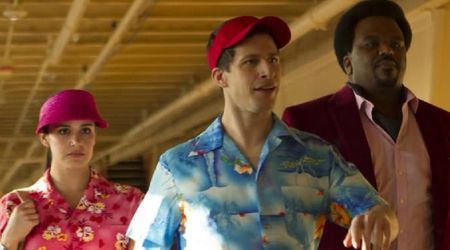The question of access may be answered in Pose's third episode, Christmas in June

Ryan Murphy's 'Pose' was one of those revolutionary shows on TV that actually spurred a lot of necessary conversations while keeping the audience engaged and aware. Many shows claim to do that, but most of them cannot retain this objective.
The first episode of the queer musical-dance series anchored in the flamboyant drag culture of '80s New York set the integral tone of the series by addressing the lesser-known perspective of the now-prominent LGBTQ+ community.
The second episode titled 'Access' which aired on June 10, sealed the deal for FX as another good show contributing to the network with a decent start of almost 700,000 viewers.
'Access' had us questioning the true meaning of it. With Blanca giving Damon an access to safe sex education, because Blanca herself could not get one and is now withering away with HIV, the disease that plagued the era.
Then comes the question of access to safe space as Damon goes on a date with Ricky and Blanca fights for the right to order drinks in a gay bar. We clearly see the limitations of access.
What's more baffling is the revelation of denial of access for people in the community from those within the same bracket.
Both Blanca and Elektra are dynamic characters determined to achieve their goals. In episode one, we saw Blanca leave Elektra's 'House of Abundance' to come up with her own 'House of Evangelista.'
Damon, a 17-year-old colored teenager who is thrown out of his house for being gay, becomes Blanca's first child of the House. Blanca does everything in her capacity to make to help realize Damon's dream of becoming a dancer and successfully enrolls him in New School for Dance.
Now the second episode, with touches of Blanca's motherly affection, showed the power of money especially when it comes to access; access to love in particular.
The most prominent example being Stan's desire to make Angel his mistress. While Stan, an average middle-class white man, trying to scale to the top of the corporate ladder in Trump organization, plays the part of a rich real-estate agent and drives a Cadillac.
But at home, he cannot afford a dishwasher for his wife, Patty. Despite the financial crunch, he spends money to see Angel doing a peep show at Show World in Times Square.
Stan grows possessive of Angel and tells her that he does not like the idea of having to share her with others who attend the show. He asks her to be his kept woman, and while she hesitates and he outrightly assures her that he will get her everything she wants, starting with an apartment.
Now, this may be the weird part where you question how can Stan be so dumb. He cannot leave his wife and he's got a child. What is it that drives him crazy enough to be by Angel's side?
Stan answers in what may be one of the best monologues to have come out of a TV show. "I’m no one. I want what I’m supposed to want, I wear what I’m supposed to wear, and I work where I’m supposed to work. I stand for nothing … I can buy things I can’t afford, which means they’re not really mine … I accumulate. I’m a brand, a middle-class white guy,” he says.
“But you are who you are, even though the price you pay is being disinvited from the world,” he adds, and just like Angel we are assured that this may work out.
There was a bit of focus in their relationship in the second episode since Stan seems to keep coming back for Angel. This subplot can emerge to be something more spectacular than it is now.
Then the very next day, Stan asks for a raise and the boss immediately knows that Stan is having an affair. The boss agrees to the hike in exchange for his dirty secrets. The boss is, in fact, a portrayal of corrupt Trump Inc, then and now. The focus, however, is on money as means to an end. With his raise, Stan gets Angel and she gets an apartment while Patty, who we are sorry for, gets her dishwasher.
On the other string for monetary issues, we feel extremely sad for Ricky, who is stood up on his date with Damon, as Damon prefers to go watch a ballet with his teacher and senior at the elite ABT, Lincoln Center. Getting stood up on a date is sad enough, but what is worse is that the homeless Ricky, discards two slices of pizza because Damon does not show up.
This episode also shows the triumph of Elektra over the new mother, Blanca. In the opening scene of the episode, Blanca has a victorious win over Elektra in the underground drag race, but the victory is short-lived as Elektra claims back her throne by the end of the episode. But, between Blanca's victory and defeat, an important scene takes place.
Blanca celebrates her win over her arch nemesis by going to Boy Lounge, a bar full of white gays and the best gay bar in the city. Blanca and her friend are kicked out by the manager who shoo them off to go to a lesbian bar instead. We clearly see the discrimination of color and sexuality even within the same community.
Blanca aspires to change the existing system of discrimination, so she goes there every day without fail, only to be kicked out. She even goes to jail, where the inmates reflect the looming homophobia of the era.
'Pose' continuously reminds us about the stance Americans took on gays and transsexuals. But it does it without pity. The reality is brutal, they are victims, but they don't act like one. That is the reason they've created an underground world of drag pose and the struggle for power to at least conquer what they can own.
That is the reason why Elektra wants to claim back her trophy of being a legendary mother. That is her world. But for Blanca, she wants to conquer the bigger world. The world deemed impossible to conquer.
This plot, with major focus on Elektra, is what you can expect in episode 3, which airs this coming Sunday. Titled 'Giving and Receiving,' it is going to be an episode of Christmas and the contrasting homely spirit of House of Evangelista over Abundance.
Now, who is ready for Christmas in June?










